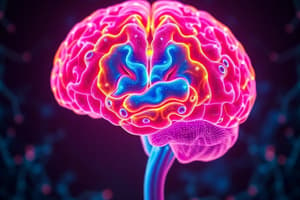Podcast
Questions and Answers
Which approach is associated with the modern study of the human mind in cognitive psychology?
Which approach is associated with the modern study of the human mind in cognitive psychology?
- Behaviorism
- Information processing era
- Cognitive science (correct)
- Introspectionism
Which of the following is NOT a method listed in the course for study?
Which of the following is NOT a method listed in the course for study?
- Coglab experiments
- Case studies
- Basic and advanced questions
- Statistics analysis (correct)
What term refers to the historical perspectives included in cognitive psychology?
What term refers to the historical perspectives included in cognitive psychology?
- Gestalt psychology
- Introspectionism (correct)
- Biblical psychology
- Cognitive neuroscience
What was the primary goal of the first cognitive psychology experiment?
What was the primary goal of the first cognitive psychology experiment?
Which method did early cognitive psychologists develop to investigate mental processes?
Which method did early cognitive psychologists develop to investigate mental processes?
What was a key principle in cognitive psychology regarding mental responses?
What was a key principle in cognitive psychology regarding mental responses?
Which psychologist is noted for contributions to psychology through the training of PhD candidates?
Which psychologist is noted for contributions to psychology through the training of PhD candidates?
What was one of the criticisms of introspectionism noted by John Watson?
What was one of the criticisms of introspectionism noted by John Watson?
In cognitive psychology, how are mental processes primarily studied?
In cognitive psychology, how are mental processes primarily studied?
Which term describes the act of looking inward to report mental experiences?
Which term describes the act of looking inward to report mental experiences?
What marked the decline of early cognitive psychology as a movement?
What marked the decline of early cognitive psychology as a movement?
What was the primary focus of behaviorism?
What was the primary focus of behaviorism?
Which of the following methods is NOT used by behaviorists?
Which of the following methods is NOT used by behaviorists?
What concept did BF Skinner introduce to behaviorism?
What concept did BF Skinner introduce to behaviorism?
What is meant by 'positive reinforcement' in behaviorism?
What is meant by 'positive reinforcement' in behaviorism?
In Pavlov's experiment, what was the unconditioned stimulus?
In Pavlov's experiment, what was the unconditioned stimulus?
How do behaviorists view the role of consciousness in psychology?
How do behaviorists view the role of consciousness in psychology?
What did Wundt aim to understand through his research?
What did Wundt aim to understand through his research?
What distinguishes classical conditioning from operant conditioning?
What distinguishes classical conditioning from operant conditioning?
What concept did Noam Chomsky argue against with regard to language development?
What concept did Noam Chomsky argue against with regard to language development?
Which experiment was pivotal in the shift to the information processing approach in cognitive psychology?
Which experiment was pivotal in the shift to the information processing approach in cognitive psychology?
In which year was the first commercially available digital computer introduced?
In which year was the first commercially available digital computer introduced?
What did the M.I.T. and Dartmouth conferences contribute to cognitive psychology?
What did the M.I.T. and Dartmouth conferences contribute to cognitive psychology?
What aspect of language did Chomsky emphasize as universally inborn?
What aspect of language did Chomsky emphasize as universally inborn?
Who authored the first cognitive psychology book in 1967?
Who authored the first cognitive psychology book in 1967?
What theory emphasizes the processing of information in the mind?
What theory emphasizes the processing of information in the mind?
Which of the following best describes the major shift in cognitive psychology during the 1950s?
Which of the following best describes the major shift in cognitive psychology during the 1950s?
What was one of the significant contributions of the conferences mentioned?
What was one of the significant contributions of the conferences mentioned?
What is the primary focus of Broadbent's flow diagram from 1958?
What is the primary focus of Broadbent's flow diagram from 1958?
What achievement was the logic theorist program known for?
What achievement was the logic theorist program known for?
Which of the following best describes a key finding concerning attention from the content?
Which of the following best describes a key finding concerning attention from the content?
When did IBM introduce the first commercially available digital computer?
When did IBM introduce the first commercially available digital computer?
Which topic was NOT covered by the conferences mentioned?
Which topic was NOT covered by the conferences mentioned?
Who were the key figures responsible for developing the logic theorist program?
Who were the key figures responsible for developing the logic theorist program?
What was a central theme addressed by the researchers at the conferences?
What was a central theme addressed by the researchers at the conferences?
What does the stimulus 'place or read' refer to in relation to the participants' reactions?
What does the stimulus 'place or read' refer to in relation to the participants' reactions?
Which physiological response is associated with the recognition of words according to the content?
Which physiological response is associated with the recognition of words according to the content?
What type of processing is involved when pronouncing a word backward in one's mind?
What type of processing is involved when pronouncing a word backward in one's mind?
What is the main focus of the relationship indicated on the graph?
What is the main focus of the relationship indicated on the graph?
What behavioral aspect is measured in connection with the stimulus presented?
What behavioral aspect is measured in connection with the stimulus presented?
What was the expected outcome when participants viewed the stimulus?
What was the expected outcome when participants viewed the stimulus?
What method is used to measure the physiological response in this context?
What method is used to measure the physiological response in this context?
What was the nature of the words being processed in the study?
What was the nature of the words being processed in the study?
Flashcards
Cognitive Psychology
Cognitive Psychology
The study of how the mind works, including processes like thinking, remembering, and problem-solving.
Cognition
Cognition
Mental processes involved in acquiring, processing, storing, and retrieving knowledge.
Introspectionism
Introspectionism
Early approach to studying the mind through self-reflection.
Behaviorism
Behaviorism
Signup and view all the flashcards
Information Processing Era
Information Processing Era
Signup and view all the flashcards
Cognitive Science
Cognitive Science
Signup and view all the flashcards
Case Study (kMF 1023)
Case Study (kMF 1023)
Signup and view all the flashcards
Coglab Experiments (KMF 1023)
Coglab Experiments (KMF 1023)
Signup and view all the flashcards
Cognitive Psychology Goal
Cognitive Psychology Goal
Signup and view all the flashcards
First Cognitive Psychology Experiment
First Cognitive Psychology Experiment
Signup and view all the flashcards
Key Principle: Mental Response Inference
Key Principle: Mental Response Inference
Signup and view all the flashcards
Analytic Introspection
Analytic Introspection
Signup and view all the flashcards
Introspectionism Limitations
Introspectionism Limitations
Signup and view all the flashcards
John Watson's Contribution
John Watson's Contribution
Signup and view all the flashcards
Introspection Definition
Introspection Definition
Signup and view all the flashcards
Operant Conditioning
Operant Conditioning
Signup and view all the flashcards
Positive Reinforcement
Positive Reinforcement
Signup and view all the flashcards
Classical Conditioning
Classical Conditioning
Signup and view all the flashcards
BF Skinner
BF Skinner
Signup and view all the flashcards
Objective Behavior measurement
Objective Behavior measurement
Signup and view all the flashcards
Chomsky's Generativity
Chomsky's Generativity
Signup and view all the flashcards
Chomsky's Critique of Behaviorism
Chomsky's Critique of Behaviorism
Signup and view all the flashcards
Innate Language Abilities
Innate Language Abilities
Signup and view all the flashcards
Cherry's Attention Experiment
Cherry's Attention Experiment
Signup and view all the flashcards
Digital Computer's Impact
Digital Computer's Impact
Signup and view all the flashcards
MIT & Dartmouth Conferences
MIT & Dartmouth Conferences
Signup and view all the flashcards
Broadbent's Flow Diagram
Broadbent's Flow Diagram
Signup and view all the flashcards
Cognitive Science Birthday
Cognitive Science Birthday
Signup and view all the flashcards
Logic Theorist Program
Logic Theorist Program
Signup and view all the flashcards
First Digital Computer
First Digital Computer
Signup and view all the flashcards
Information Processing Approach
Information Processing Approach
Signup and view all the flashcards
Attention Filtering
Attention Filtering
Signup and view all the flashcards
Early Computers
Early Computers
Signup and view all the flashcards
What is cognitive psychology?
What is cognitive psychology?
Signup and view all the flashcards
Behavioral Response
Behavioral Response
Signup and view all the flashcards
Physiological Response
Physiological Response
Signup and view all the flashcards
fMRI
fMRI
Signup and view all the flashcards
Semantic Processing
Semantic Processing
Signup and view all the flashcards
Perirhinal Cortex
Perirhinal Cortex
Signup and view all the flashcards
Cognitive Psychology Experiment
Cognitive Psychology Experiment
Signup and view all the flashcards
Relationship between learning, behavior, and brain activity
Relationship between learning, behavior, and brain activity
Signup and view all the flashcards
Study Notes
Cognitive Psychology - Chapter 1
- Warning: Cheating, copying, or plagiarism is strictly prohibited. 80% attendance is required for the final exam.
Course Assessments
- Case Studies (20%): Groups of 5 students analyze 2 case studies and answer associated questions.
- Coglab Experiments (30%): Groups of 5 students conduct 5 chosen experiments, answering basic and/or advanced questions from the manual.
Contents: Chapter 1: Introduction to Cognitive Psychology
- Definition: Cognition refers to "knowing". Cognitive psychology studies mental processes like acquiring, storing, organizing, and using information.
- History: Early approaches include introspectionism (subjective observation), behaviorism (observing behavior), and later, information processing, focusing on how the mind processes information. Modern cognitive science combines various fields (psychology, philosophy, AI, etc.) to understand the mind.
- Modern Approach: Cognitive science explores the human mind. It utilizes various methods to study the mind and its interaction with the body.
Everyday Cognition
- Example: Sarah walking to her friend. Includes many cognitive aspects like perception, attention, memory, language, reasoning, and decision making.
Complexity in Cognition
- Cognitive processes are often complex and hidden from view.
- The Stroop effect illustrates how a seemingly simple task can be difficult. (Naming the color of words printed in a different color can be challenging).
History of Cognitive Psychology
- 19th Century: Early cognitive psychology experiments focused on reaction time, measuring the time it took people to respond to stimuli.
- Wilhelm Wundt: Established the first psychology laboratory, aiming to study the mind scientifically. He used introspection (self-reporting), but this method had limitations.
- Introspectionism: A method of studying the mind by asking subjects to report their inner experiences.
Behaviorism
- Rejected introspection as a valid method.
- Focused solely on observable behaviors and environmental factors that caused them.
- Classical conditioning (Pavlov) and operant conditioning (Skinner).
- 1950s - Decline due to limitations in explaining complex behaviors and certain phenomena (such as language).
The Rise of the Information Processing Era
-
Emphasizes how the mind processes information.
-
Uses computers as a helpful analogy to explain mental processes.
-
Introduced concepts of memory, attention, and problem solving.
-
Information processing involves steps: input, processing, output.
-
Influenced by Cherry's attention experiments, and the emergence of digital computers.
-
Newell and Simon's "Logic Theorist" program, and other early computer programs
-
M.I.T. & Dartmouth Conferences (1956) considered the birth of cognitive science.
-
Reaction time (RT): A measure of the speed between a stimulus and a response.
-
Simple reaction Time vs Choice Reaction Time: Measuring differences in response time to determine the mental processes involved in decision-making.
-
Modern Approach to Studying the Mind: Combines various approaches, looking at both behavior and underlying physiological processes to understand cognitive functions.
-
Example from (Davachi et al, 2003): Studies on the effects of different word processing methods on memory/brain activity.
-
The relationship between behavior and physiology for memory is explored.
Studying That Suits You
Use AI to generate personalized quizzes and flashcards to suit your learning preferences.



